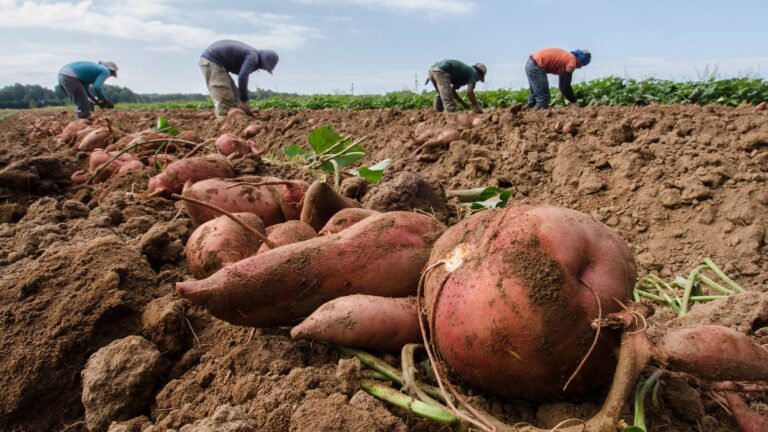President Donald Trump is once again signaling possible immigration relief for farmworkers, days after his administration resumed controversial workplace raids targeting undocumented laborers in agriculture and hospitality.
Speaking to USA Today reporters recently during a trip to his Bedminster, New Jersey, golf club, Trump said he was exploring a plan to shield “good, reputable farmers” from immigration crackdowns.
“We can’t put the farms out of business,” he said, while adding, “We don’t want to hurt people that aren’t criminals.”
But the statements arrive amid whiplash-inducing policy shifts. After Trump initially called for protections for migrant workers in industries like agriculture and hospitality in a June 12 Truth Social post, his administration briefly directed immigration agents to pause raids on farms, hotels, and meatpacking plants. That pause didn’t last. By the following week, U.S. Immigration and Customs Enforcement had resumed enforcement actions, leaving both employers and workers confused and fearful.
“There’s fear and worry once more,” said Rebecca Shi, executive director of the American Business Immigration Coalition. “That’s not a way to run business when your employees are at this level of stress and trauma.”
The ambiguity has already taken a toll on the labor supply. In New Mexico, one dairy lost more than half its workforce after an ICE raid. In Washington state, mere rumors of raids have kept workers away from cherry orchards — slashing one crew from 150 pickers down to just 20.
ICE officials, including border czar Tom Homan, have insisted raids will continue based on a prioritized approach that targets workers with criminal records.
“There’s a right way and wrong way to hire workers,” Homan said, pointing to existing legal farm labor programs.
Still, many in the ag industry argue that those programs are insufficient to meet real-world labor demands. According to the U.S. Department of Agriculture, about 42 percent of crop farmworkers between 2020 and 2022 lacked legal work authorization. In California, that share is even higher.
And as Kansas Livestock Association CEO Matt Teagarden told reporters, “The people pushing for these raids have no idea how farms operate.”
Trump Agricultural Secretary Brooke Rollins has reportedly relayed industry concerns directly to the president. Trump, in turn, acknowledged the difficult reality: “You have people that have worked on farms for 20 years. It’s very hard to go in there and say, ‘You’re coming out.’”
Despite his hardline stance on immigration, Trump has attempted to strike a conciliatory tone with rural voters and farmers. “I never want to hurt our farmers,” he said. “They keep us happy and healthy and fat.”


:max_bytes(150000):strip_icc()/AlexPaulMitchek-45453aa7f31a43bf82a6794ea2682f4b.jpg)
:max_bytes(150000):strip_icc()/BloombergContributor-2197125766-3217c07cd0984adcb474c357b0e75856.jpg)
:max_bytes(150000):strip_icc()/IMG_5402-2000-b4d3b346719e43ba9762f243e32696a4.jpg)



:max_bytes(150000):strip_icc()/Corn-and-soybeans-August-2025-Indiana-c57b46534cdf48849ebf4366bd69e0fe.jpg)
:max_bytes(150000):strip_icc()/TysonFoodsLogoBlue-1-9a9c4e39ca9240679f0d2021d1ca4c9e.png)
:max_bytes(150000):strip_icc()/IMG_8926-2048x1365-ab5d434f75e14904b69cbb4a22f9cd06.jpg)